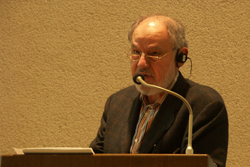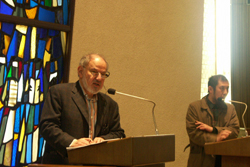Center for Interdisciplinary Study of Monotheistic Religions(CISMOR)Doshisha University
> Public Lectures > Thinking about Law, Morality and Religion in the Story of Egyptian ModernizationPublic Lectures
Lecture (Open for the public)
Thinking about Law, Morality and Religion in the Story of Egyptian Modernization
| Date: |
2005/03/23 |
|---|---|
| Place: | Chapel in the Divinity Hall, Imadegawa Campus, Doshisha Univ. |
| Lecture: | Prof. Talal Asad (The City Univ. of New York) |
|
Dr. Asad raised a question about the distinction between law and morality, which is regarded as having been established through the provision of positive law during the modern era. He introduced the reformist thinking of two Islamists in modern Egypt, Tariq al-Bishri and Ahmad Safwat. Four points were the focus of Dr. Asad’s comments on these thinkers: 1) legal validity as rooted in society 2) equality of individuals before the law 3) reconsideration of fiqh (Islamic jurisprudence) 4) relationship between law and morality 1) Legal validity as rooted in society Al-Bishri was anxious about the split between codified law and everyday morality in Egypt. He thought it may endanger the state. At the same time, he saw that it was impossible that law and morality would be completely congruent. It could be said that for al-Bishri, legal authority would not exist without the belief that there is a moral obligation to obey it. 2) Equality of individuals before the law Safwat promoted the principle of freedom of agreement between equal parities, especially in the marriage contract. This idea, already popular among the middle class in Egypt, was also widespread among positivist thinkers who believed it to be crucial for modern society. 3) Reconsideration of fiqh Under the reflection of al-Bishri’s thought, Safwat had the vision that the sharia could be reformed according the state and society. Safwat re-interpreted the fiqh, arguing that the source of law could be unified with the Qur’an. He classified three groups of acts: haram (forbidden), wajib (madatory), and jaiz (permitted). By this means, the legal status of all jaiz (permitted acts) is made identical, no matter whether they all are mentioned in the Qur’an or not. Relationship between law and morality For Safwat, it was clear that morality was based on conscience and belief. The state punishes individuals for violating rules according to the positive law, while sacred law applies in cases of contravening religious morality, but only in the domain of inner conscience. Punishment is also sometimes imposed in this world for contravening religious morality, because law and ethics are usually closely interrelated in societies. Safwat noted that the concepts of morality and law were defined in terms of social rules. He pointed to the distinction between the ways the obligatory character of these rules is constituted in each case in different sources of the sanctions that are attached to them: one based on public power, the other on private belief. 'Morality,' then, is seen as the totality of obligatory rules that lack state sanctions. According to Dr. Asad, Safwat changed the meaning of morality. In terms of the connection to the rules of morality, reformers like Safwat shifted the emphasis to make clear the definitive characteristics of moral rules. They found more importance in the connection between individuals and 'obligation,' which is commanded by rules of morality, than in the rules of morality themselves. Dr. Asad pointed out that through the transition to the positive law, dependence on the relevant knowledge of community and the moral credibility of individuals (qadi, 'witnesses') also changed. He argued that the figure of the prophet ceases to be the object of ethical imitation in this transition. In other words, positive law intends that morality no longer depends on developable virtues, but on the inner conscience of the individual. Dr. Asad also argued that the changes in law, religion, and morality indicate the continuing removal of restrictions on social choice, and new ways of constituting and experiencing social relations-thus, of becoming moral subjects. He added that the change may also produce moral dilemmas. 'Privatizing morality' accompanied by the positivization of law and social knowledge has heightened some contradictions-as seen, for example, in the affair of the Islamic veil in French public schools. Dr. Asad analyzed the process of the separation of law and ethics in the modern changes of Egyptian law. He claimed that in this process morality, including the concept of it, has been changed, and proposed that the positivization of law be seen as part of a wider movement that includes the positivization of ethics and of social knowledge. Finally, he cited as questionable the claim that modern state law does not regulate moral behavior. Asuka Nakamura (COE Research Instructor, CISMOR, Doshisha University) |
|
|
Handout |
|

